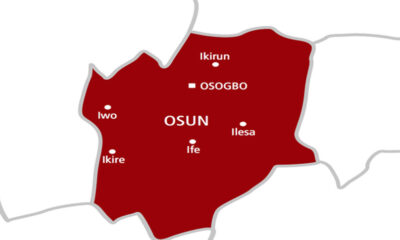Business
Cooking gas price to rise next week, say marketers

Cooking gas price to rise next week, say marketers
Tougher times are ahead of gas consumers, as marketers have hinted that prices will go up next week.
The President of the Nigerian Association of Liquefied Petroleum Gas Marketers, Olatunbosun Oladapo, said gas consumers should brace themselves for price hikes starting next week.
He cited rising international prices, high tax rates and prices of vessels, forex scarcity, and naira devaluation as some of the reasons for the intended price review.
“It is starting next week because international prices have gone up. The prices of vessels have gone up and taxes are high, but consumers are not earning more.
“Their purchasing power has gone down. Everybody is crying. Consumers, middlemen, and retailers are feeling the impact because business is now on the low side,” he said.
Olatunbosun described the imminent price increment as unfortunate.
“The situation is very unfortunate because prices are going higher. Nigerian consumers are passing through very difficult times because they can no longer afford gas,” he added.
According to him, consumers are now returning to firewood, charcoal, and sawdust for cooking.
READ ALSO:
-
Man who threatened President Biden shot dead in FBI raid – report
-
Sanusi briefs Tinubu after meeting with Niger coupists
-
I now eat dry rice, ousted Niger president laments hardship
“The government should come in and alleviate the suffering of the masses by providing palliatives, reducing taxes and levies.
“You can imagine that for every 1kg of gas priced at N700, tax would take way N3.50. How much is left in such a business?” he continued.
He urged the government to tax profit and not products because consumers were not buying gas anymore.
“Local taxes are worsening the problem,” he said, calling on marketers who had the opportunity to buy products locally to fix prices with “consumers’ sympathy” in mind.
His reaction came on the heels of findings by The PUNCH that vessel scarcity in the international market would push up local prices of Liquified Natural Gas, also known as cooking gas in the coming months.
Vessel scarcity in the international market has led to charter rate hikes, ahead of the 2023 winter, when demand for heating fuel peaks.
As of August 1, 2023, charter rates surged to $284,750 per day for November and $206,750/day for October, quadrupling the current price of $70,500/day, according to data from Spark Commodities quoted by Bloomberg.
“Tanker supplies are increasingly tight because traders are using the ships as floating storage in a bet that LNG prices will rise as the weather turns colder.
“Volatile shipping rates can eat up margin for an LNG trader looking to cash in on higher winter prices, and rising transportation costs ultimately can mean higher prices for buyers in Europe and Asia.”
The number of LNG vessels floating on the water for at least 20 days also rose in late July, with 42 vessels tracked, which is about 27 per cent higher than the same time a year earlier.
Nigerian LPG prices are internationally benchmarked based on Nigerian Liquefied Natural Gas Contract prices and are always influenced by international prices.
READ ALSO:
-
Gunmen set another ex-Lawmaker’s house ablaze in Imo
-
Discrepancies befall Niger coup plotters as former rebel leader forms anti-coup movement
-
Just in: Sanusi ex-Kano emir meets with Niger military leaders
And like other internationally traded commodities subjected to price fluctuations due to market dynamics, the NLNG CP is subject to changes and can be reviewed either upwards or downwards at least once to three times.
The devaluation of the local currency would also impact the domestic price of LPG.
The dollar exchanged for N749.62 on Wednesday, according to the Central Bank of Nigeria.
The Nigerian LNG usually sells the cooking gas it produces locally to off-takers based on the prevailing exchange rate.
The PUNCH checks showed that the prices of 20 metric tonnes of LPG at the major depots in Apapa, Lagos, between July 28 and August 7 had been between N10.7m and 11m.
Local consumers of cooking gas have for some months now enjoyed low prices due to a drop in international prices.
The price of LPG dropped from an average of N730 per kilogram in June to around N600/kg in July and increased to N750/kg in August due to the naira devaluation.
As of June, the price dropped by 76.1 per cent to 2.10 per one million British Thermal Units on May 31 from 8.78 per one million BTU, according to U.S. Energy Information Administration.
A report by the National Bureau of Statistics on retail gas prices said the average retail price for refilling a 5kg cylinder of cooking gas decreased by 6.71 per cent month-on-month from N4,360.69 recorded in May to N4,068.26 in June.
Cooking gas price to rise next week, say marketers
Business
Finally, NERC unbundles TCN, creates new system operator

Finally, NERC unbundles TCN, creates new system operator
The Nigerian Electricity Regulatory Commission (NERC) has set up the Nigerian Independent System Operator of Nigeria Limited (NISO) as it unbundles the Transmission Company of Nigeria (TCN).
The transmission leg of the power sector has over the years been seen as weakest link with obsolete equipment.
The unbundling announcement is contained in an Order dated April 30, 2023 and jointly signed by NERC chairman, Sanusi Garba, and vice chairman, Musiliu Oseni.
By this order, the TCN is expected to transfer all market and system operation functions to the new company.
The commission had previously issued transmission service provider (TSP) and system operations (SO) licences to the TCN, in accordance with the Electric Power Sector Reform Act.
The Electricity Act 2023, which came into effect on June 9, provided clearer guidelines for the incorporation and licensing of the independent system operator (ISO), as well as the transfer of assets and liabilities of TCN’s portion of the ISO.
In the circular, the commission ordered the Bureau of Public Enterprises (BPE) to incorporate, unfailingly on May 31, a private company limited by shares under the Companies and Allied Matters Act (CAMA), 2020.
NERC said the company is expected “to carry out the market and system operation functions stipulated in the Electricity Act and the terms and conditions of the system operation licence issued to the TCN.
“The name of the company shall, subject to availability at Corporate Affairs Commission, be the Nigerian Independent System Operator of Nigeria Limited (“NISO”),” NERC said.
Citing the object clause of the NISO’s memorandum of association (MOU) as provided in the Electricity Act, NERC said the company would “hold and manage all assets and liabilities pertaining to market and system operation on behalf of market participants and consumer groups or such stakeholders as the Commission may specify.”
Business
Naira depreciates again, trades at N1,402/$

Naira depreciates again, trades at N1,402/$
The Nigerian currency, naira, on Thursday slightly depreciated at the official market, trading at N1,402.67 to the dollar.
Data from the official trading platform of the FMDQ Exchange, a platform that oversees the Nigerian Autonomous Foreign Exchange Market (NAFEM), showed that the naira lost N11.71
READ ALSO:
- Why I killed my one-year-old son – Delta woman
- Bandits kill nine civilian JTF members, kidnap three in Sokoto
- Yahaya Bello govt spending third term in office through Ododo – Clark
This represents a 0.84 per cent loss when compared to the previous trading date on Tuesday April 30, when it exchanged at 1,390.96 to a dollar.
However, the total daily turnover increased to 232.84 million dollars on Thursday, up from 225.36 million dollars recorded on Tuesday.
Meanwhile, at the Investor’s and Exporter’s (I&E) window, the naira traded between 1,445.00 and N1,299.42 against the dollar.
Naira depreciates again, trades at N1,402/$
Auto
Appeal court takes over NURTW case as NIC withdraws

Appeal court takes over NURTW case as NIC withdraws
The National Industrial Court has withdrawn from a case involving Alhaji Najeem Usman Yasin, Board of Trustees chairman of the National Union of Road Transport Workers (NURTW), and Alhaji Tajudeen Ibikunle Baruwa’s ambition to return as president of the union over lack of jurisdiction.
The industrial court’s decision was made to avoid conflict with the Court of Appeal, where the matter is already being heard.
Before the NIC announced its decision to hands-off the case, the defendants’ counsel, Mr. O.I. Olorundare SAN, had informed the court that the matter is currently before the Court of Appeal, Abuja division, and that the industrial court could not continue to adjudicate on the same matter.
The counsel cited authorities to support his claim, adding that the National Industrial Court does not have concurrent jurisdiction with the Court of Appeal.
The presiding judge, O.O. Oyewunmi, struck out the case, stating that the Appeal Court had taken over the matter and that the Industrial Court must respect the hierarchy of courts.
Alhaji Yasin and six others took the case to the Appeal Court, challenging the decision of the industrial court recognising a delegates’ conference held on May 24, 2023, where Baruwa was proclaimed as President of the union for a second term in office.
With the latest NIC judgement, both parties will now proceed to defend their positions at the Court of Appeal and await the final judgement.
-

 International3 days ago
International3 days agoUS students slam Biden’s comments on Gaza encampments
-

 News3 days ago
News3 days agoLagos GDP hits N41tn, earns N433bn from IGR
-

 Entertainment3 days ago
Entertainment3 days agoSanwo-Olu appoints KWAM1’S daughter as aide
-

 News3 days ago
News3 days agoI never said I’m a billionaire— Ex-Anambra CP
-

 News2 days ago
News2 days agoDon’t host US, French military bases in Nigeria, northern leaders warn Tinubu
-

 International3 days ago
International3 days agoDam collapses, death toll rises in Brazil floods
-

 Sports23 hours ago
Sports23 hours agoRonaldo’s hat-trick leads Al Nassr to 6-0 victory over Al Wehda
-

 News3 days ago
News3 days agoGroup protests alleged imposition of Imam in Osun




















